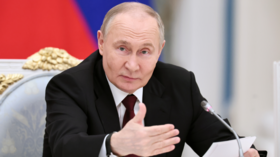Interview with Anatoly Kucherena
The Institute of Democracy and Co-operation was set up to promote democracy. The Institute is the brainchild of Russian lawyer Anatoly Kucherena, who says the organisation aims to improve Russia's image abroad.
“Our main goal is co-operation with professionals in the field of democracy and in the field of development of democratic institutions. We want to exchange opinions, to organise round tables and public hearings on issues regarding development of democratic institutions. I'm convinced that such contacts are necessary, such dialogue is vital. When I speak to human rights activists in Europe and the U.S. I realise that many politicians and public figures have absolutely no idea about what is really going on in modern Russia and how our civil institutions and our democracy are developing. Many of those I've spoken to think that such meetings would be useful,” Anatoly Kucherena said.
“I wouldn't want the organization to be labelled as a human rights watchdog. Human rights issues are not the only thing we want to deal with. Our main goal is different. We want to study electoral processes abroad; we want to study problems in relations between various ethnic groups and a whole lot of other issues. Our scope is broader than human rights,” he added.
“For us it's important to exchange opinions and to improve Russia's image abroad. Russia is a young country if we look at the period since 1991. Still, we've achieved a lot and that's what we need to show our foreign colleagues, so that we can take decisions together. It's important not to criticize and lash out at each other but to understand existing problems. Before taking decisions, politicians need opinions not just from advisers but also from civil society and qualified specialists. Only then will their decisions bring positive results,” the lawyer said.
“This is not what I should be thinking about. My colleagues and I realize that there are very few Russian NGOs abroad. Politicians and the general public receive information about Russia either from official sources or sources that are unreliable or that have a negative attitude towards our country. So when we created this organisation our main goal was co-operation with our foreign colleagues,” Kucherena explained.
“We want to show that Russia, despite being a young country, has the resources and the professionals who are doing a lot to develop democracy and the rule of law. The legacy left by the Soviet Union is a complicated one. Now, politicians often struggle with decisions that used to be taken within the legal framework of the USSR. To work out correct recommendations we need to stop aiming poisoned arrows at each other and sit down together. It's not only in Russia that human rights abuses exist. The only way to resolve the problems is to work together. So we intend to bring together a whole variety of opinions. This is the only way to shake up public opinion so that leaders can take the right decisions,” he said.











